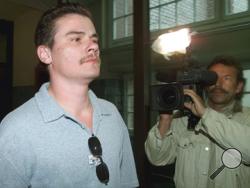COLORADO SPRINGS, Colo. (AP) — Heidi Krieger didn't ask questions when her coaches added a regimen of blue pills to the handful of vitamins she was already taking every day.
She didn't object that her daily workouts were nothing more than extended weight-lifting sessions with no true practice in the techniques of shot put.
She liked winning, enjoyed the travel, the attention and all the other perks that came with the success — so even though she shot up from 152 pounds (69 kilograms) to 230 pounds (104 kg) over the span of two years, she did what her coaches asked and stuck with the program.
Once part of the steroid-addled East German sports powerhouse of the 1980s, Heidi Krieger is now Andreas Krieger — and his is an eye-opening reminder of the evils of state-sponsored doping in sports.
"In some ways, they played God without including me or asking me," Krieger said in an interview he recently taped with the German Anti-Doping Agency.
Krieger said the program he was part of was called "State Plan 1425." In some ways, it mirrors what has been taking place more recently in Russia, where sports and government officials have been accused of pressuring athletes into taking performance-enhancing drugs, then making payoffs on the other end to ensure the substances wouldn't be detected.
Already, Russia's anti-doping agency has been decertified and the Russian track team has been suspended — its eligibility for next year's Rio Games in question while the country tries to build a clean program.
Krieger never made the Olympics. The goal, he said, was to be the first woman to send the shot put more than 23 meters. Krieger threw it 21.1 meters at the 1986 European Championships, and the gold medal she won there was the highlight of a career that began, in earnest, in 1979 when she was enrolled into the Sports School for Children and Youth in Berlin.
Krieger described "State Plan 1425" as a "systematic plan that monitored every step, from the research to the athlete." The drug of choice was called Oral-Turinabol, a then-undetectable steroid that, combined with birth-control pills given to Krieger, helped her increase muscle mass while steadily stealing away signs of womanhood.
Krieger said he took more than double the amount of steroids as Ben Johnson, the doped sprinter whose fall from grace came during the 1988 Olympics.
There were humiliations: The strange looks she got at the airport when she asked where the ladies' room was. The whispers of "Here comes Hormone Heidi" when she headed out to the field.
But success came, and the perks were there.
For a young woman in Communist East Germany, the trips to the West to compete, replete with fancy hotels and lavish meals, were highlights. She got an apartment — something uncommon for someone her age.
"I was put in my place," Krieger said. "'You're an athlete. You have to function like we want you to or else you can get out of here.' Basically, I was threatened."
During training sessions, she "lifted weights until I couldn't move."
Krieger totaled it up: At one point over a two-week stretch, she had lifted more than 100 tons in the weight room. Krieger's knees, hips and back still ache today because of those weightlifting sessions.
Not until she had outlived her usefulness to the East German sports machine did she truly comprehend the toll the steroids had taken.
Working a modest job at a pet store in 1995, a fellow employee told her what transsexuality was.
"I cried out of relief, shock, realization," he said.
Three surgeries and three years of treatment later, Heidi became Andreas.
"The decision to live as Andreas Krieger, that saved my life," he said.
But not until 2000, when Krieger testified in trials against East German sports officials, did he finally realize that the accomplishments he'd made as Heidi had been accumulated with illegal help. "I came to grips with the fact that my achievements weren't real," he said. "I reached them with chemicals but didn't manage them on my own."
He now works as a spokesman for the German Anti-Doping Agency, telling his story in the hopes that nobody will have to go through this again.
He has reached a peace, of sorts, but the emotional toll from his years in the East German system lingers.
The decision to become Andreas Krieger alienated him from his family. Krieger says his mother and three brothers don't speak to him.
At the trial, he met former East German swimmer Ute Krause, who was also part of the country's doping system. In 2002, they married.
He says Krause's family "accepts me for who I am. I'm not perfect."

